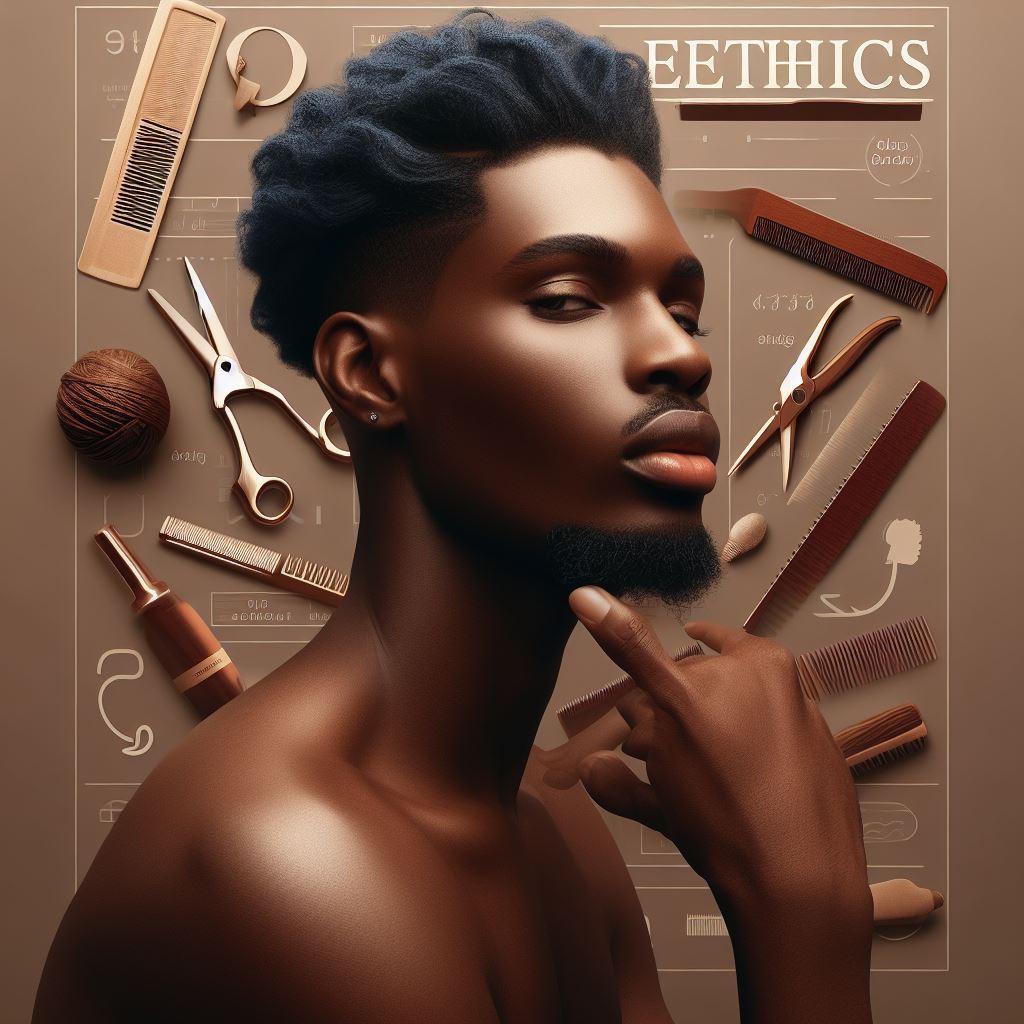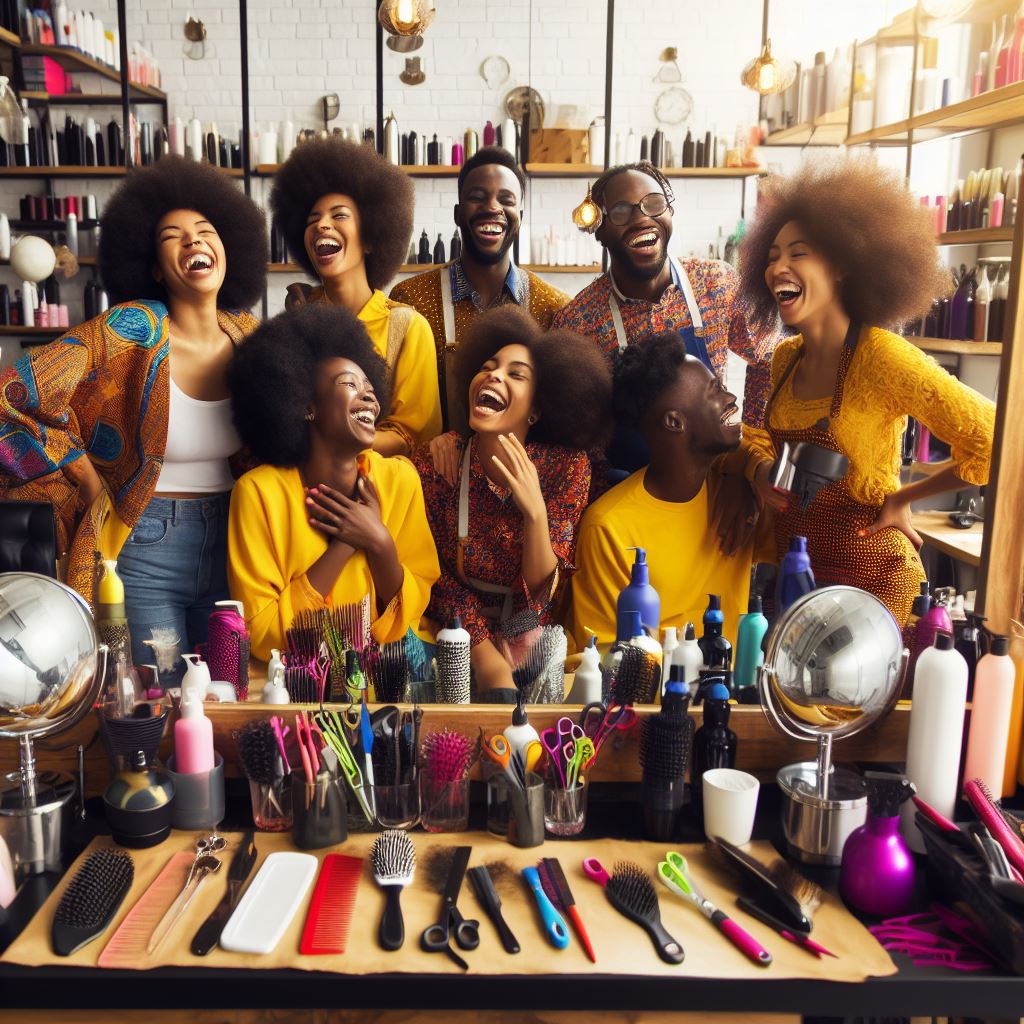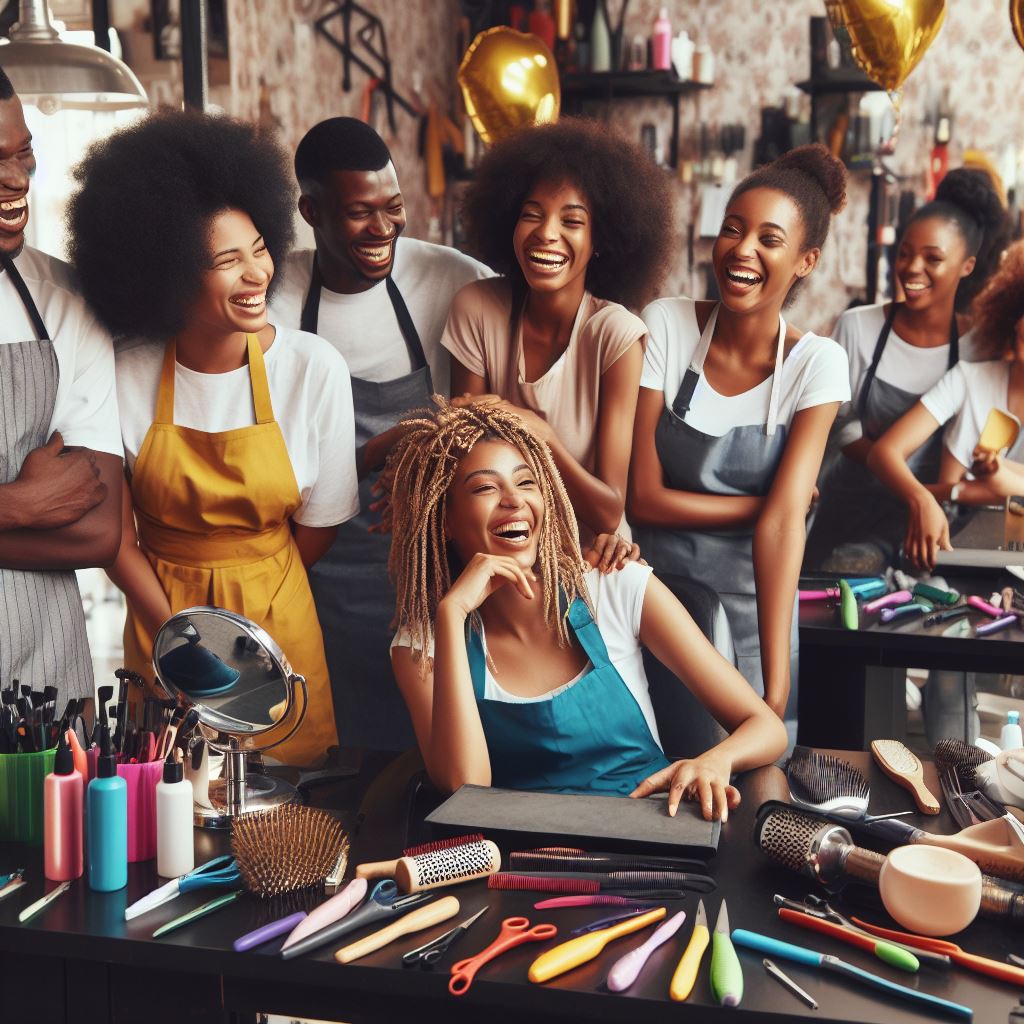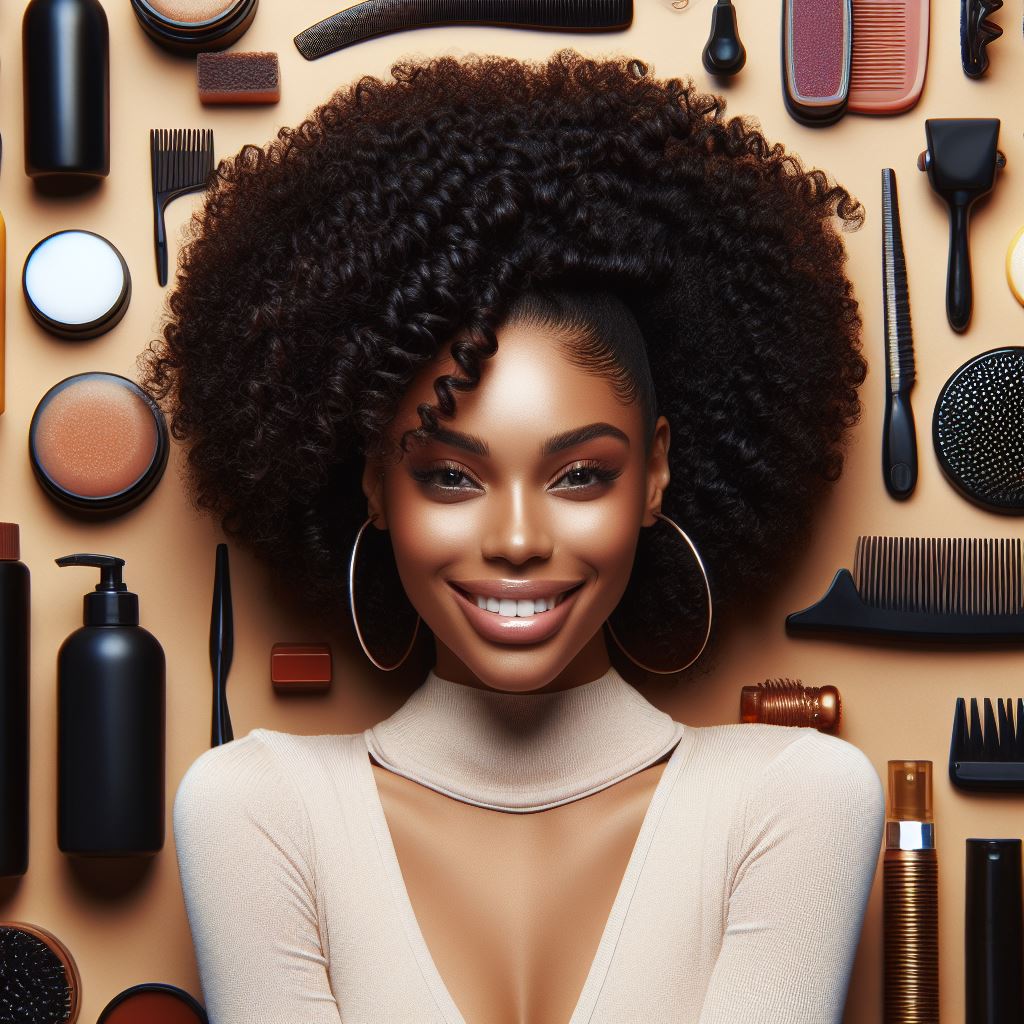Introduction
Brief background on hair styling in Nigeria
In Nigeria, hair styling holds great cultural significance and has a rich history.
Importance of ethics in the hair styling industry.
Ethics play a pivotal role in maintaining professionalism, trust, and customer satisfaction in the hair styling industry.
Exploring the ethics of hair styling from a Nigerian stylist’s perspective.
This blog post aims to delve into the ethical considerations that Nigerian hair stylists face and how they navigate them.
Understanding the Nigerian hair styling industry
Overview of traditional Nigerian hairstyles
- Traditional Nigerian hairstyles are diverse and reflect the cultural heritage of different ethnic groups.
- Styles such as cornrows, locs, and braids have been passed down through generations.
- These hairstyles often hold cultural and symbolic significance, representing identity and social status.
- Traditional hairstyling techniques are intricate and require skill and precision.
- Nigerian women have embraced their natural hair, leading to a resurgence in traditional hairstyles.
Evolution of hair styling techniques in Nigeria
- With globalization and Western influences, Nigerian hair styling has evolved over time.
- Weaves, extensions, and wigs have become popular alongside traditional styles.
- Modern hair styling techniques incorporate a fusion of traditional and contemporary elements.
- Nigerian stylists continually innovate by introducing new techniques and designs.
- The availability of haircare products and tools has greatly influenced the industry’s growth.
Role of hair stylists in Nigerian society
- Hair stylists play a vital role in enhancing the beauty and self-confidence of Nigerians.
- They create unique styles that reflect individual personalities and cultural backgrounds.
- Nigerian hair stylists have become entrepreneurs, contributing to the country’s economy.
- They provide employment opportunities for many and support the growth of the beauty industry.
- Hair stylists also act as cultural ambassadors, showcasing Nigerian hairstyles globally.
Ethical Considerations in Hair Styling
As a Nigerian hair stylist, I believe that ethical considerations play a crucial role in the hair styling profession.
It is vital to prioritize the well-being of clients, respect their individual wishes and cultural diversity, and ensure fair pricing practices.
Health and Safety Concerns
- Proper Sanitation Practices: Maintaining a clean and hygienic salon environment is non-negotiable. Regular disinfection of tools, workstations, and surfaces prevents the spread of infections, ensuring the safety of both clients and stylists.
- Use of Safe and Ethical Hair Products: Using hair products that are not only safe for clients but also environmentally friendly showcases ethical responsibility. Avoiding harmful chemicals and choosing natural or sustainable alternatives promotes the health of both individuals and the planet.
Respect for Clients’ Wishes and Cultural Diversity
- Importance of Communication and Consent: Establishing open and transparent communication with clients is key. Understanding their desired hairstyle, discussing any concerns or limitations, and obtaining informed consent enable a respectful and collaborative hair styling experience.
- Appreciating Diversity in Hair Types and Styles: Nigeria is a culturally diverse country with a wide range of hair types and styles. Being knowledgeable about various hair textures and having the skills to work with different hair types showcases respect for clients’ unique identities and cultural backgrounds.
Fair Pricing and Transparency
- Reasonable and Transparent Pricing Policies: Adopting pricing policies that are fair and reasonable is essential. Clients should be aware of the services they are paying for, and the charges should reflect the effort, expertise, and quality of the hair styling work provided.
- Avoiding Price Discrimination Based on Race, Class, or Gender: Discrimination has no place in the hair styling industry. Pricing should be consistent and not influenced by factors such as race, class, or gender. Every client should be treated equitably and given equal access to quality services at a fair price.
In review, ethical considerations are vital in the field of hair styling.
Upholding health and safety standards, respecting clients’ wishes and cultural diversity, and ensuring fair and transparent pricing policies contribute to creating a positive and inclusive hair styling experience for all.
As a Nigerian stylist, I am committed to embracing these ethical principles and providing exceptional services to my clients.
Read: International Views: Fundraising in Nigeria Compared
Challenges faced by Nigerian hair stylists in upholding ethics
Limited access to quality hair products and tools
- Nigerian hair stylists often struggle to find quality hair products and tools, hindering their ability to uphold ethical standards.
- The lack of access to quality products and tools can result in subpar hair styling experiences for clients.
- Stylists may resort to using inferior products and tools, compromising the health and appearance of clients’ hair.
- Limited access to quality products also restricts the creativity and variety of hairstyles that stylists can offer.
Dealing with clients’ unrealistic expectations
- Nigerian hair stylists frequently encounter clients with unrealistic expectations for their hair styling outcomes.
- Clients may demand hairstyles that are not suitable for their hair type or require excessive manipulation that can result in damage.
- Stylists face the challenge of managing clients’ expectations while ensuring they adhere to ethical practices.
- Open communication and consultations are crucial in educating clients about the limitations and potential risks of certain hairstyles.
Competition and the pressure to compromise ethics for profit
- Nigerian hair stylists operate in a highly competitive industry, leading to pressure to compromise ethics for profit.
- Some stylists may feel compelled to cut corners, using harmful chemicals or unsustainable techniques to save time and attract more clients.
- The pressure to meet financial targets can outweigh the commitment to ethical practices, putting clients’ hair health at risk.
- Overcoming this challenge requires stylists to prioritize education and awareness, emphasizing the importance of ethical hair styling.
In fact, Nigerian hair stylists face various challenges in upholding ethical standards.
Limited access to quality hair products and tools hinders their ability to provide optimal services.
Dealing with clients’ unrealistic expectations requires appropriate communication and education.
Additionally, the competitive industry exerts pressure on stylists to compromise ethics for profit, which demands a strong commitment to education and awareness in maintaining ethical practices.
Read: Building Trust: Transparency in Fundraising in Nigeria

A Nigerian stylist’s approach to ethical hair styling
Emphasizing education and training
- Continuous education and training are crucial for Nigerian hair stylists to stay updated with industry standards.
- Stylists should pursue certifications and attend workshops to enhance their skills and knowledge.
- Through education, stylists can provide clients with accurate advice on hair care routines and styling techniques.
- An informed stylist can help clients make informed decisions about their hair, promoting overall hair health.
- By investing in education, stylists ensure they are equipped to handle different hair types and textures professionally.
Promoting natural hair care and healthy practices
- Nigerian stylists prioritize the promotion of natural hair care and discourage harmful practices like chemical treatments.
- They educate clients about the benefits of embracing their natural hair texture and using gentle products.
- Stylists encourage clients to follow a healthy hair care routine that includes regular washing, conditioning, and protective styling.
- They emphasize the importance of moisturizing and sealing techniques to maintain moisture balance in the hair.
- Using heat styling tools responsibly and minimizing heat damage is also a key aspect of ethical hair styling.
Encouraging inclusivity and celebrating cultural heritage
- Nigerian stylists celebrate the diversity of hair textures and design styles that resonate with different cultural backgrounds.
- They encourage clients to embrace their cultural heritage through hairstyling choices.
- Stylists are trained in a wide range of traditional Nigerian hairstyles, allowing them to offer clients a rich cultural experience.
- They ensure that clients feel valued, respected, and represented by providing a safe space for self-expression.
- Nigerian stylists promote inclusivity by welcoming clients of all hair types and styles, fostering a sense of unity.
In short, a Nigerian stylist’s approach to ethical hair styling encompasses emphasizing education and training, promoting natural hair care, and healthy practices, as well as encouraging inclusivity and celebrating cultural heritage.
By prioritizing continuous education, stylists stay updated with industry standards and offer informed advice to clients.
They advocate for natural hair care, discouraging harmful practices and promoting overall hair health.
Additionally, Nigerian stylists celebrate diversity and create a welcoming environment where clients can embrace their cultural heritage through hairstyling choices.
Through these ethical practices, Nigerian stylists play a crucial role in empowering individuals to embrace their natural hair and celebrate their unique identities.
Read: Hair Styling in Nigeria: A Guide to the Profession
Case studies: Ethical hair styling in practice
Highlighting ethical hair salons in Nigeria
- The Orient Hair Lounge in Lagos promotes sustainability by using eco-friendly products and practices.
- Naturalistas Hair Salon in Abuja focuses on providing organic and chemical-free hair treatments.
- The Green Hair Salon in Port Harcourt utilizes renewable energy sources and recycles hair salon waste.
Success stories of Nigerian stylists prioritizing ethics
- Ola is a renowned Nigerian stylist who promotes ethical hair styling by using natural hair products and techniques.
- Chika gained recognition for her inclusive and diverse approach to hair styling, celebrating the beauty of all hair types.
- Tunde prioritizes the health of his clients’ hair by offering personalized treatment plans and avoiding harmful chemicals.
Lessons learned and inspiration for aspiring stylists
- Ethics in hair styling go beyond just the final look, focusing on sustainability, inclusivity, and prioritizing client’s hair health.
- Aspiring stylists can learn from ethical hair salons and successful stylists, incorporating sustainable and natural practices.
- Building a reputation for ethical hair styling requires consistent adherence to ethical principles and ongoing self-education.
Overall, these case studies demonstrate that ethical hair styling is gaining momentum in Nigeria, with salons and stylists exemplifying sustainable practices, promoting inclusivity, and prioritizing the health of their clients’ hair.
Aspiring stylists can draw inspiration from these success stories and incorporate ethical principles into their own practices for a more responsible and conscious approach to hair styling.
Read: Becoming a Hair Stylist in Nigeria: What to Know
Conclusion
Recap of the importance of ethics in hair styling
Ethics play a crucial role in the hair styling industry, ensuring client satisfaction and trust.
Final thoughts from a Nigerian stylist’s perspective
As a Nigerian stylist, I’ve witnessed the impact of ethical practices on the industry’s reputation and growth.
Encouragement to create a more ethical hair styling industry
I encourage all stylists and professionals to prioritize ethics, fostering a positive and responsible hair styling environment.




